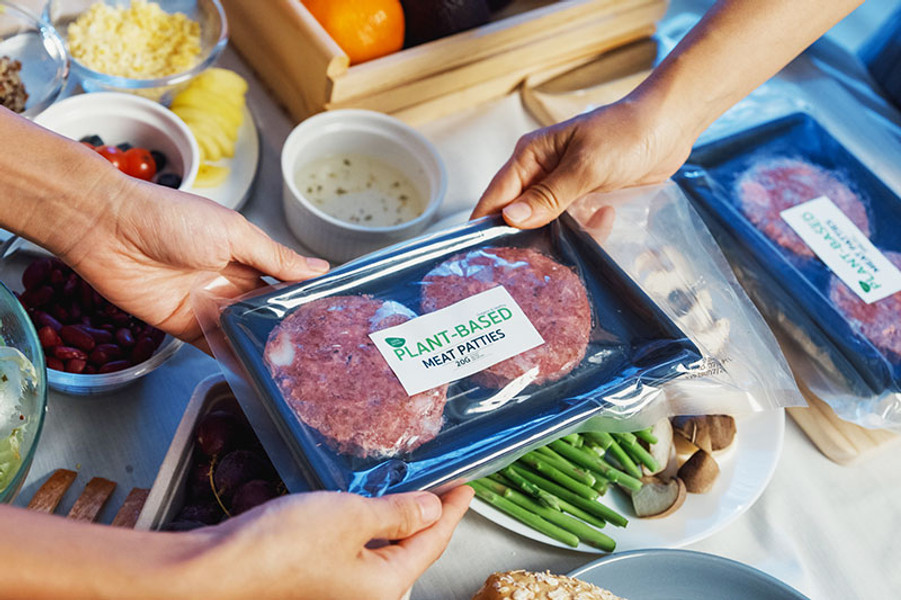Fake Meat - A Threat to Your Heart!
Posted by Fresh Harvest Market on 13th Jun 2024
The modern diet has undergone significant changes with the advent of ultra-processed foods, which now constitute a large portion of daily intake for many individuals. While plant-based diets are often promoted for their health benefits, the ultra-processing of these foods can have unforeseen consequences. Recent analyses from the UK Biobank cohort shed light on the impact of ultra-processed plant-origin foods on cardiovascular risk, revealing important implications for public health.
Understanding Ultra-Processed Foods
Ultra-processed foods are industrial formulations typically made from substances derived from foods and additives, with minimal whole food content. These products are designed for convenience, affordability, and long shelf-life. Examples include snacks, sugary drinks, ready-to-eat meals, and various meat substitutes. While these foods are convenient, their high content of added sugars, unhealthy fats, salt, and numerous additives can negatively affect health and your heart.
The UK Biobank Cohort Study
The UK Biobank is a large-scale biomedical database that includes detailed health and lifestyle information from over 500,000 participants. This resource allows researchers to investigate the long-term impacts of dietary habits on health outcomes, including cardiovascular diseases.
Key Findings
1. Increased Cardiovascular Risk: The analysis of the UK Biobank cohort revealed a significant association between the consumption of ultra-processed plant-based foods and an increased risk of cardiovascular diseases (CVD). Participants with higher intake of these foods showed higher rates of heart attacks, strokes, and other cardiovascular conditions.
2. Nutritional Quality Concerns: Despite being plant-based, these ultra-processed foods often contain high levels of sugar, sodium, and unhealthy fats. For instance, plant-based burgers and nuggets may have similar or even higher levels of saturated fats and sodium compared to their meat counterparts, which can contribute to hypertension and other cardiovascular issues.
3. Additives and Preservatives: Ultra-processed plant-based foods are laden with additives such as artificial flavors, colors, and preservatives. Substances like monosodium glutamate (MSG), artificial sweeteners, and emulsifiers have been linked to various health problems, including metabolic disturbances and inflammation, which are risk factors for cardiovascular diseases.
4. Misleading Health Perceptions: Many consumers choose plant-based options believing they are healthier. However, the "health halo" effect of plant-based foods can be misleading when these products are highly processed. The marketing of these products often highlights their plant origins while downplaying the extensive processing and artificial ingredients involved.
Mechanisms Behind Increased Risk
1. Inflammation: Additives and high levels of refined carbohydrates in ultra-processed foods can trigger inflammation, a key factor in the development of atherosclerosis and other cardiovascular diseases.
2. Blood Pressure: High sodium content in many ultra-processed plant-based foods can lead to elevated blood pressure, a significant risk factor for heart attacks and strokes.
3. Lipid Profiles: Unhealthy fats present in these foods can adversely affect lipid profiles, increasing bad cholesterol (LDL) and decreasing good cholesterol (HDL), thereby heightening cardiovascular risk.
The Chemicals in Fake Meat
Here’s a breakdown of some of the most common chemicals found in vegan fake meat:
- Sodium Chloride (Salt)
- What It Does: Enhances flavor and preserves the product.
- Why It’s Bad: High sodium intake can lead to high blood pressure, increasing the risk of heart disease and stroke.
- Hydrogenated Oils
- What It Does: Adds texture and extends shelf life.
- Why It’s Bad: Contains trans fats, which can raise bad cholesterol levels (LDL) and lower good cholesterol (HDL), contributing to heart disease.
- Artificial Flavors
- What It Does: Mimics the taste of real meat.
- Why It’s Bad: These chemicals can cause allergic reactions and have been linked to cancer in some studies.
- Preservatives (e.g., BHA, BHT)
- What It Does: Prevents spoilage and extends shelf life.
- Why It’s Bad: BHA and BHT have been associated with cancer in animal studies and may disrupt hormone function in humans.
- Yeast Extract (Glutamate)
- What It Does: Boosts flavor and adds umami taste.
- Why It’s Bad: High levels of glutamate can cause headaches, nausea, and, in sensitive individuals, may trigger symptoms of anxiety and depression.
- Methylcellulose
- What It Does: Acts as a binder to give meat-like texture.
- Why It’s Bad: While generally recognized as safe, it can cause digestive issues such as bloating and gas in some individuals.
- Artificial Colorings (e.g., Red 40, Yellow 5)
- What It Does: Gives the meat-like appearance.
- Why It’s Bad: These dyes can cause allergic reactions and have been linked to hyperactivity in children and certain types of cancer.
- Isolated Soy Protein
- What It Does: Provides protein and mimics the texture of meat.
- Why It’s Bad: High consumption of soy protein isolate may disrupt hormone levels and cause thyroid issues, especially in individuals with soy allergies or sensitivities.
- Propylene Glycol
- What It Does: Keeps the product moist and prevents freezer burn.
- Why It’s Bad: Can be toxic in large amounts, causing kidney and liver damage, and is also linked to skin irritation and respiratory problems.
- Flavour Enhancers (e.g., Monosodium Glutamate or MSG)
- What It Does: Intensifies flavor.
- Why It’s Bad: MSG can cause headaches, sweating, and nausea in sensitive individuals, sometimes referred to as “Chinese restaurant syndrome.”
Recommendations for Consumers
1. Choose Whole Foods: Emphasize whole, minimally processed plant foods such as fruits, vegetables, legumes, nuts, and seeds. These foods provide essential nutrients without the harmful additives found in ultra-processed options.
2. Read Labels Carefully: Scrutinize ingredient lists and nutritional information on packaged foods. Avoid products with long lists of unfamiliar ingredients and high levels of sugar, sodium, and unhealthy fats.
3. Prepare Meals at Home: Preparing meals from scratch allows for better control over ingredients and cooking methods, reducing reliance on ultra-processed foods.
4. Be Wary of Marketing Claims: Do not be swayed solely by claims of "plant-based" or "vegan." Assess the overall nutritional quality and degree of processing involved.

